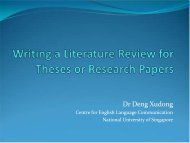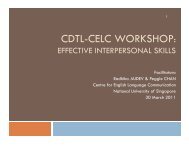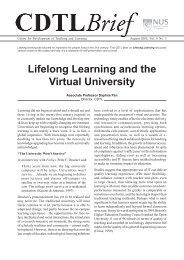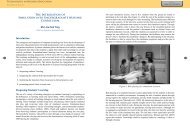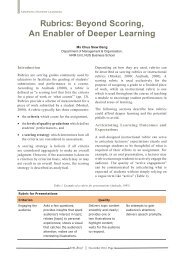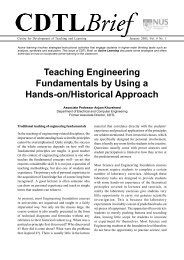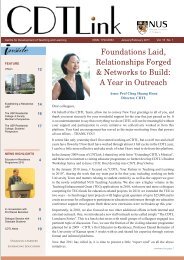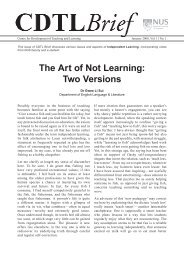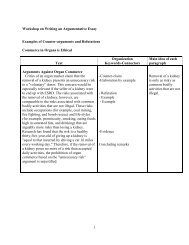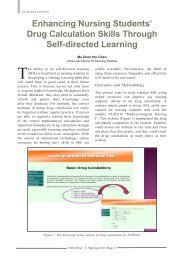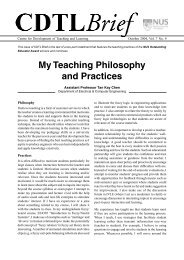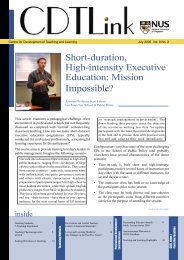Religion as a Heuristic Anchor: Studying the Various ... - CDTL
Religion as a Heuristic Anchor: Studying the Various ... - CDTL
Religion as a Heuristic Anchor: Studying the Various ... - CDTL
You also want an ePaper? Increase the reach of your titles
YUMPU automatically turns print PDFs into web optimized ePapers that Google loves.
<strong>the</strong> complexities and dynamics of issues affecting <strong>the</strong> behaviour<br />
of real estate players during different stages of <strong>the</strong> real estate<br />
development cycle. This multi-disciplinary module looks at <strong>the</strong><br />
different principles, concepts and methodologies of behavioural<br />
studies in real estate using real estate <strong>as</strong> a product and <strong>the</strong><br />
real estate market <strong>as</strong> <strong>the</strong> background. The module adopts an<br />
interdisciplinary approach, hinging upon <strong>the</strong>ories and applications<br />
from disciplines such <strong>as</strong> psychology, sociology and economics.<br />
The module comprises interactive lectures, on-site learning and<br />
workshops. Students will also have <strong>the</strong> opportunity to gr<strong>as</strong>p first<br />
hand perspectives of real issues affecting <strong>the</strong> behaviour of real<br />
estate players.<br />
I have completed <strong>the</strong> second run of <strong>the</strong> module in Semester 1 of<br />
AY 2005/2006. When <strong>the</strong> module w<strong>as</strong> first introduced in AY<br />
2004/2005, less than 20 students registered for it, but student<br />
numbers incre<strong>as</strong>ed to 74 during its second run in AY 2005/2006.<br />
It w<strong>as</strong> also during <strong>the</strong> second run that students had opportunities<br />
to experience better insights on <strong>the</strong> behavioural perspectives<br />
during property developments launches and <strong>as</strong>set management<br />
stages of property development. Students were also enthusi<strong>as</strong>tic in<br />
producing good quality submissions. During <strong>the</strong> final examinations<br />
for <strong>the</strong> module, multimedia slides were used to enhance students’<br />
understanding of examination questions b<strong>as</strong>ed on behavioural<br />
perspectives.<br />
Focusing on behavioural studies will certainly widen <strong>the</strong><br />
opportunities for real estate research and education. While adding<br />
fur<strong>the</strong>r dimensions to existing <strong>the</strong>ories from o<strong>the</strong>r disciplines,<br />
behavioural studies will also deepen students’ understanding of<br />
real estate issues from <strong>the</strong> behavioural perspectives. This will<br />
ultimately enhance <strong>the</strong> real estate industry.<br />
References<br />
Black, R.; Brown, G.; Diaz, J.; Gibler, K. & Grissom, T. (200 ). ‘Behavioural Research<br />
in Real Estate: A Search for <strong>the</strong> Boundaries’. Journal of Real Estate Practice and<br />
Education. Vol. 6, No. 1, pp. 85–112.<br />
Levy, D. & Henry, M. (200 ). ‘A Comparative Analysis of US, UK and Australian<br />
Published Property Research Methodologies and Methods’. Pacific Rim Property<br />
Research Journal. Vol. 9, No. 2, pp. 148–162.<br />
Ling, D. & Archer, W. (2005). Real Estate Principles: A Value Approach. McGraw-<br />
Hill/Irwin, New York.<br />
<strong>CDTL</strong> Brief / October 2006, Page 6<br />
<strong>CDTL</strong><br />
The Centre for Development of<br />
Teaching and Learning (<strong>CDTL</strong>)<br />
engages in a wide range of activities<br />
to promote good teaching and learning<br />
at <strong>the</strong> National University of Singapore,<br />
including professional development,<br />
teaching and learning support,<br />
research on educational issues, and<br />
instructional design and development.<br />
contributors<br />
Julius Bautista<br />
Rajesh R. Parwani<br />
Mosseri Avraham<br />
Muhammad Faishal Ibrahim<br />
advisor<br />
Daphne Pan<br />
editors<br />
Teo Siok Tuan<br />
Sharon Koh<br />
layout<br />
Ma Lin Lin<br />
© 2006 <strong>CDTL</strong> Brief<br />
is published by <strong>the</strong><br />
Centre for Development of<br />
Teaching and Learning.<br />
Reproduction in whole or in part<br />
of any material in this publication<br />
without <strong>the</strong> written permission<br />
of <strong>CDTL</strong> is expressly prohibited.<br />
The views expressed or implied<br />
in <strong>CDTL</strong> Brief do not necessarily<br />
reflect <strong>the</strong> views of <strong>CDTL</strong>.<br />
An online version is available<br />
at our website.<br />
Comments, suggestions and<br />
contributions should be addressed to:<br />
The Editor, <strong>CDTL</strong> Brief<br />
Centre for Development of<br />
Teaching and Learning<br />
Central Library Annexe, Level 6<br />
National University of Singapore<br />
10 Kent Ridge Crescent<br />
Singapore 119260<br />
Tel: (65) 6516-3052<br />
Fax: (65) 6777-0342<br />
Email: cdtpost@nus.edu.sg<br />
http://www.cdtl.nus.edu.sg<br />
Printed in Singapore by First Printers Pte Ltd



